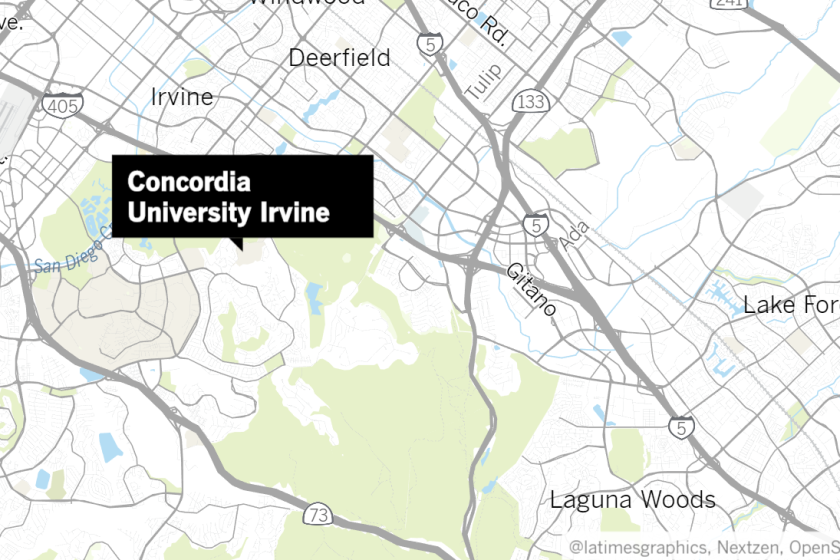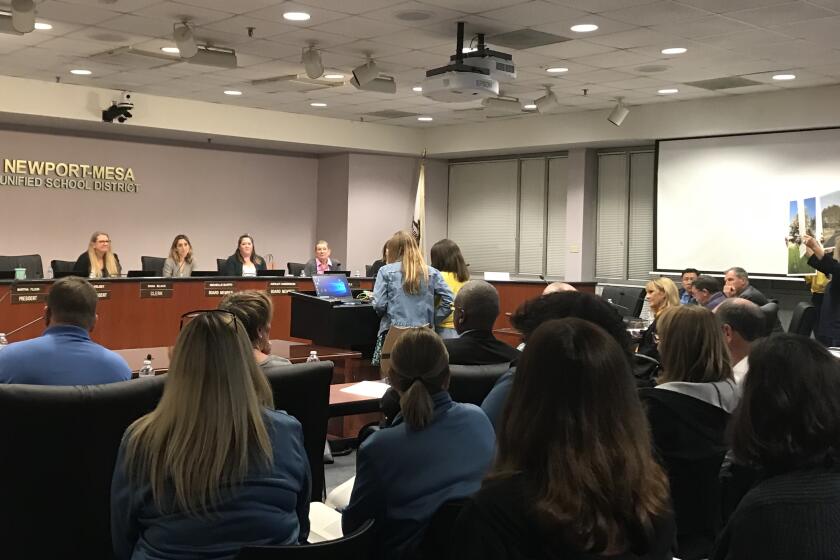Commentary: Education’s unprecedented present may forecast future problems
- Share via
As we approach the end of a year in which the COVID-19 pandemic brought unprecedented upheaval to education, and as schools lurch backward and forward and back again in varying stages of reopening their campuses, parents are understandably worried about the future.
They wonder about the long-term impact of all the disruption, and if their children will suffer lasting harm.
The answer: Yes. No. It depends.
Now that I’ve cleared that up for you, I will amend the above to state categorically that no one can predict with anything approaching precision how the long-range effects on students will manifest. Although we have hints from history, some educated guesses and earnest efforts to mitigate the impact, the uniqueness of our current situation obstructs our long-range view toward what lies ahead.
The 1918 flu pandemic fundamentally altered the world, but that was a different disease that hit young people particularly hard, and it occurred long before computers and the Internet could be used for distance learning.
More recently, the school shutdowns in Christchurch, New Zealand after an earthquake in 2011 did not result in long-term learning losses, researchers found. It was similar after Hurricane Katrina in New Orleans in 2005. But those closures lasted weeks, not several months, and were contained to specific geographic areas.
Among the biggest worries now is that our current crisis is exacerbating the deep inequalities that already existed in education.
A coronavirus outbreak at Concordia University in Irvine has infected over 60 people. The school cancels athletic practices, urges against Thanksgiving travel.
Since the beginning of the pandemic and the switch to mainly online learning, schools have experienced increases in absenteeism, and attention-deficit and motivational issues have multiplied. Some students didn’t have access to the devices or Wi-Fi they needed to connect to their classes, and many had difficulties finding adequate space to do their work.
All these problems hit students on the lower end of the socioeconomic spectrum hardest. And even though school administrators and teachers have been working overtime to bring disadvantaged students up to speed, those kids remain at risk of suffering disproportionate learning losses.
The consequences of those losses could unfold in significant ways in the years to come.
A report by the consulting firm McKinsey & Co. warned of larger academic achievement gaps and higher drop-out rates that simply can’t be erased in a year. It’s possible we will see long-term harm to individuals and society, including greater income disparities, higher crime rates and lower economic growth, it said.
These are not inevitable outcomes, McKinsey noted. But lasting damage is increasingly likely if we don’t urgently intervene to give more support to the most vulnerable students.
The other, possibly even greater, concern is over the potential impact to the social-emotional development and well-being of students.
From primary grades to higher education, schools have long assumed responsibility for fostering the growth of what is often referred to as “the whole child.” Schools aren’t seen as mere academic factories but also play a key role in developing kids’ broader understanding of how to function in society. They are where students learn to navigate relationships, explore interests and mark important milestones.
Suddenly last spring, a big chunk of that developmental underpinning was yanked away, and it has remained largely absent ever since.
While more data is needed, reports have been surfacing with alarming regularity pointing to increases in students experiencing symptoms of anxiety, depression and suicidal ideation due to feelings of isolation and alienation.
Even absent serious mental health issues, parents fear that their children’s overall development has been hindered, a possibility that could take years to address.
Whipsawed school administrators, who’ve been tasked with wrestling chaos into some facsimile of orderliness and productivity, say that they are coping with these issues as best they can.
“This is such a unique situation that has really caused us to reinvent ourselves in a short period of time,” said John Drake, Newport-Mesa Unified’s assistant superintendent and chief academic officer.
The district, which recently welcomed students back to campus part time, is attempting to identify those most in danger, he said. It’s providing additional professional development for teachers, and increased counseling and other support services for students.
A retired educator offers advice and well wishes to newly elected members of the Newport-Mesa Unified School District Board of Education.
But Drake said he’s “reluctant to be a fortune teller” regarding any possible long-term effects.
Cal State Fullerton opted to take the “slow and steady” approach to reopening, said Vincent Vigil, CSUF’s associate vice president for student affairs. He’s been meeting every other day with colleagues to plan strategies, a mission complicated by setbacks in the state’s pandemic response.
The biggest impact on students so far has been financial, he said. Funds from the federal CARES Act helped, and CSUF has so far avoided the enrollment declines seen at many other universities.
Vigil did have one prediction: “Higher education after this is never going to be the same again,” From now on, he believes, there will always be a substantial online component.
“We’re doing all these things that we thought before, ‘Hey, that’s not going to work.’ But we’ve had to make it effective. We had to force ourselves to do it.”
I expect that before we get through the pandemic, we’ll all be required to summon even greater levels of patience and resilience, and the aftermath could present more challenges still. As for exactly how all the force-fed experimentation will effect this generation of guinea-pig students — well, that’s anyone’s guess.
All the latest on Orange County from Orange County.
Get our free TimesOC newsletter.
You may occasionally receive promotional content from the Daily Pilot.








